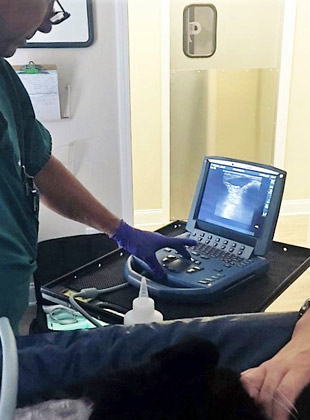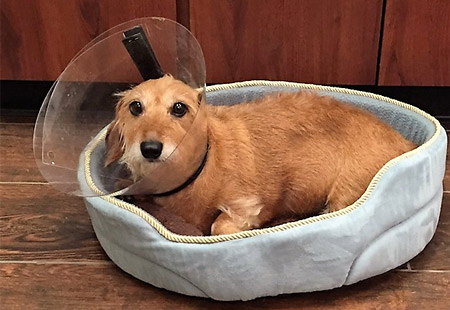Pet Health Care Services

Internal Medicine for Your Moore County Pet
Despite the very best preventive veterinary care, your pet may still become sick. When this happens, it is stressful for both you and your pet, especially when you can't simply ask your companion what's wrong. You need a skilled veterinarian whom you can trust to accurately diagnose and effectively treat your pet.
While the focus at PineHills Veterinary Hospital is your pet's wellness, an important part of the services we offer is the diagnosis and non-surgical treatment of diseases that can affect your pet's internal organs and body systems. Experienced veterinarians—supported by advanced diagnostic technology like digital radiology, ultrasound and video endoscope—are able to quickly identify and effectively treat a range of complex internal medicine diseases.
Glaucoma Prevention
Glaucoma is a common condition in which the fluid pressure inside the eye increases, resulting in damage to the optic nerve and the possibility for weakening or loss of vision. There are two types of glaucoma. Primary, or chronic, glaucoma is hereditary or develops as your pet ages. Secondary, or acute, glaucoma develops as the result of an injury or illness. Because secondary glaucoma can progress rapidly, it is considered an emergency situation.
Symptoms of glaucoma to look for include:
- Redness in the eye
- Tearing or discharge
- Eye sensitivity to light
- Cloudy-looking eye
- Bulging eyeball
The Importance of Glaucoma Screening
The experienced veterinarian at PineHills Veterinary Hospital recommends your pet receive a routine glaucoma exam as part of his or her regular wellness care. The exam is not only an effective screening measure for chronic and acute glaucoma, it can also help set a baseline measurement of your pet's normal intraocular pressure (IOP). Establishing an IOP baseline is important because the normal measurement can vary between species, breeds and even individual pets.
This is a noninvasive, simple procedure that should not cause your pet pain or discomfort. We apply a mild anesthetic eye-drop to ensure your pet is comfortable during the exam.
Allergies and Skin Problems in Dogs and Cats

Allergies are quite common in dogs of all breeds and backgrounds, typically due to fleas, but it can also be the result of food or an inhaled irritant like dust or pollen. Most allergies appear after the pet is 6 months of age, with the majority of affected dogs over age 2. The most common symptom associated with allergies is itching of the skin, either localized or generalized. Other symptoms include respiratory distress (coughing, sneezing and wheezing), or digestive problems causing vomiting, flatulence or diarrhea.
Flea allergy is the most common allergy in cats. A normal cat experiences only minor skin irritation at the site of the bite. The flea allergic cat on the other hand has a severe, itch-producing reaction when the flea's saliva is deposited in the skin. Just one bite causes such intense itching that the cat may severely scratch or chew itself, leading to hair loss and open sores or scabs on the skin. The area most commonly involved is over the rump or base of the tail.
Symptoms of Pet Skin Allergy
It is important to be able to identify the first signs and symptoms of allergies and dermatological conditions:
- Scratching, licking, chewing or biting of skin, feet and ears
- Red, raised, scaly areas on the skin
- Bumps, crusts or pus-filled vesicles on the skin
- Increased skin pigmentation
- Thickened skin
- Loss of hair
- Salivary staining (brown color)
- Head shaking
If your pet exhibits any of these symptoms, please make an appointment to have him or her seen at PineHills Veterinary Hospital. We will evaluate your pet, determine the most effective method of treatment and explain how you can prevent future problems. Common tests include allergy testing, skin scraping, cytology, skin biopsy and comprehensive dermatology exams. If left untreated, allergic reactions and skin conditions can become serious medical concerns.
Pet Behavior Counseling
Even with the right training and lots of attention and love, your dog or cat may develop bad habits or unwanted behaviors. Please don't make the mistake of believing that you and your family must live with these problems or worse, consider giving up your pet.
PineHills Veterinary Hospital offers behavior counseling for many of your pet's problems, including inappropriate urination or defecation, aggression, separation anxiety, inappropriate chewing and more.
Your Pet's Nutrition

Proper nutrition and a balanced diet, along with fresh, clean water, is an essential ingredient for your pet's overall good health. As your pet's caregiver, nutrition is the most significant health variable that you control.
To support your efforts, your veterinarian will perform a thorough body condition evaluation during every physical examination, and give recommendations based on what we see. We can also provide you with important information on proper serving size, nutrient needs and feeding strategies for your individual pet. We will also help you navigate pet food claims so you can make the most informed choices.
Pet Prescription Diets
Some pets have serious nutritional challenges or chronic conditions that benefit from a special diet. When that is the case, we may recommend feeding your pet a special prescription diet. Making this change can have a significant positive impact on your pet's overall health and well-being.
Prescription diets benefit medical conditions such as liver disease, bladder and kidney disease, digestive problems, renal failure, food allergies, diabetes and more. PineHills Veterinary Hospital carries high-quality prescription foods, including Royal Canin and Purina Rx. If your pet requires a prescription diet we do not carry, we can easily order it for you.
Stem Cell Therapy and Your Pet
Stem cell therapy uses stem cells from your pet's own body to repair and regenerate damaged tissues. Stem cells have the unique ability to mature into cells with specialized functions, which makes them extremely valuable for repairing certain body tissues damaged by injury or disease. Stem cell therapy is most commonly used to treat osteoarthritis in dogs and cats, but clinical research continues to explore other uses for stem cells, including repairing bone, ligament and spinal cord injuries and treating kidney and liver disease.
The decision to use stem cell therapy is based on your pet's specific condition, age, breed, previous treatment and response, severity and duration, and anesthesia/sedation risk. A full examination and consultation are necessary before proceeding with this innovative medical treatment.
Treating Your Pet's Cancer
At PineHills Veterinary Hospital, we consider many factors in advising the most appropriate course of treatment for your pet's particular case.
The standard treatment for almost all pet cancers at the hospital is surgical removal of the lump. Benign (non-invasive, non-spreading) cancers in an accessible, well-defined area are almost always permanently cured by surgical removal. Surgery is also the best treatment for the majority of malignant cancers that have not yet spread (metastasized). Complex procedures may require referral to a specialist, including biopsies and aspirates can be sent to North Carolina State for histopathology.




